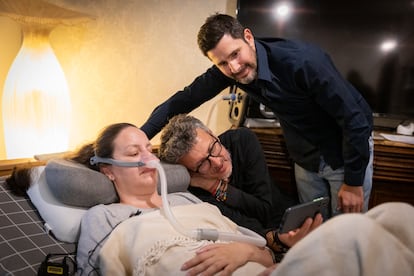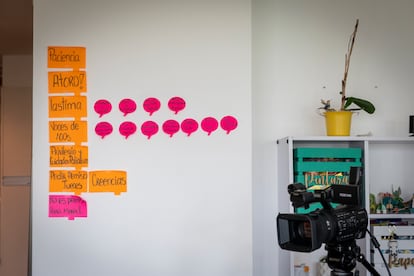‘It is a request made out of love’: The woman with ALS who brought about the legalization of euthanasia in Ecuador
Paola Roldán is pleased that now she will not have to flee her country to have a dignified death
One might have thought that the moment when the ruling of the Constitutional Court of Ecuador legalizing euthanasia was announced would be a time of celebration, but this was not quite the case. Paola Roldán, a woman with Amyotrophic lateral sclerosis (ALS) whose insistence has brought about this profound change in a highly conservative and religious country, where the Church is the second most credible institution among citizens, cannot quite believe it herself. The same goes for her relatives and her lawyers. They know they are making history, which is what they sought to do, but it means that Paola has the right to die and that is her desire. There is no knowing if an imminent end is the reason for any kind of celebration.
The judges had voted on the case on Monday in a closed session. The ruling could be issued at any time, and the days passed until Wednesday afternoon, when news reports said that the court would announce its decision. It had reached a ruling in just six months, which was an uncommonly fast turnaround time. At Paola’s house, everything centers around her four-year-old son, who runs and jumps. “We were watching the news and my son says to me: Mommy, you’re so pretty on TV. He grounds us,” says Paola on the phone a few hours before hearing the details of the sentence. The day was spent amidst the everyday things in a house and the messages from relatives with other devastating illnesses who were also awaiting the decision. Somewhere between the ordinary and the transcendental.

Paola, 42, was diagnosed with ALS in August 2023. The degenerative disease soon weakened the muscles in her body. Just a few months later, she was no longer able to walk and was confined to bed on a ventilator, unable to move. It is from there that she runs everything in the house. She organizes a time capsule for her son, gifts, letters, pictures that he will receive on his birthday, his graduation, Christmas, special days when she is not around. “Shopping lists for my husband so he knows what to buy so he doesn’t have to worry, household chores, bank account arrangements, I’ve organized everything, now I’d like to leave something else,” says Paola. “A therapeutic support network for people with disabling illnesses and their families, and then to rest,” she adds.
The last few months her body has grown even weaker, with her last episode in December. “We didn’t know what was wrong with me, and then we found out that my body is rejecting intravenous feeding. Now I am only on serums and vitamins and my body felt a shock, I couldn’t even wake up, I slept many hours. Now I am a little more used to it, losing weight gradually,” she explains.

Her lawyers are now studying the fine print. It’s not enough for the judges to have approved the decriminalization of euthanasia, since when and how it is regulated is also important. In a second call with EL PAÍS, Paola reacts to the decision: “I don’t know how to put into words that this is an option, it is not an obligation. It is for those of us who believe in it and also for those who are frightened by it, for those who are repelled by it. And it is a decision that is a request I made out of love, out of compassion, and I feel that the sentence reflects that.”
The court granted almost all of Paola’s request. It allowed euthanasia to be granted on two grounds. The person requesting it must be subject to intense suffering resulting from a serious and irreversible bodily injury or a serious and incurable disease. And the individual must express his or her unequivocal, free and informed consent, and in the event that he or she is unable to do so, a representative must be able to decide. “This has produced a great deal of emotions in me, the court has permitted that in certain cases the family members can decide, I am overwhelmed with gratitude to have been a vehicle for so many people,” says Paola.
Her social media is full of messages of support and of gratitude, calling her brave, even though she doesn’t like that. She knows the conclusion of this news, as she has done since she was diagnosed with ALS, but now she has another option. “I was thinking about some messages from many people who wrote to me telling me that I should go to Colombia, where euthanasia is legal, and I thought how glad I am that now I don’t have to flee my country. Today, Ecuador welcomes me a bit more.”
— I remember the first time we met you said that this had to happen, that it might not happen for you, but it had to happen.
— Can you believe I get to see it? When I started this, everybody told me it was impossible, that the court would take three years to decide and I wasn’t going to see it. And I said fine, it doesn’t matter. It’s like when you plant a tree and everyone sits in the shade. I could see it and I’m also sitting in the shade of the tree I planted and so are many others who have more urgency and more despair than I do.
Sign up for our weekly newsletter to get more English-language news coverage from EL PAÍS USA Edition
Tu suscripción se está usando en otro dispositivo
¿Quieres añadir otro usuario a tu suscripción?
Si continúas leyendo en este dispositivo, no se podrá leer en el otro.
FlechaTu suscripción se está usando en otro dispositivo y solo puedes acceder a EL PAÍS desde un dispositivo a la vez.
Si quieres compartir tu cuenta, cambia tu suscripción a la modalidad Premium, así podrás añadir otro usuario. Cada uno accederá con su propia cuenta de email, lo que os permitirá personalizar vuestra experiencia en EL PAÍS.
¿Tienes una suscripción de empresa? Accede aquí para contratar más cuentas.
En el caso de no saber quién está usando tu cuenta, te recomendamos cambiar tu contraseña aquí.
Si decides continuar compartiendo tu cuenta, este mensaje se mostrará en tu dispositivo y en el de la otra persona que está usando tu cuenta de forma indefinida, afectando a tu experiencia de lectura. Puedes consultar aquí los términos y condiciones de la suscripción digital.








































